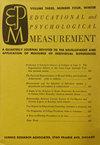Exploring the Influence of Response Styles on Continuous Scale Assessments: Insights From a Novel Modeling Approach
IF 2.3
3区 心理学
Q2 MATHEMATICS, INTERDISCIPLINARY APPLICATIONS
引用次数: 0
Abstract
The use of discrete categorical formats to assess psychological traits has a long-standing tradition that is deeply embedded in item response theory models. The increasing prevalence and endorsement of computer- or web-based testing has led to greater focus on continuous response formats, which offer numerous advantages in both respondent experience and methodological considerations. Response styles, which are frequently observed in self-reported data, reflect a propensity to answer questionnaire items in a consistent manner, regardless of the item content. These response styles have been identified as causes of skewed scale scores and biased trait inferences. In this study, we investigate the impact of response styles on individuals’ responses within a continuous scale context, with a specific emphasis on extreme response style (ERS) and acquiescence response style (ARS). Building upon the established continuous response model (CRM), we propose extensions known as the CRM-ERS and CRM-ARS. These extensions are employed to quantitatively capture individual variations in these distinct response styles. The effectiveness of the proposed models was evaluated through a series of simulation studies. Bayesian methods were employed to effectively calibrate the model parameters. The results demonstrate that both models achieve satisfactory parameter recovery. Neglecting the effects of response styles led to biased estimation, underscoring the importance of accounting for these effects. Moreover, the estimation accuracy improved with increasing test length and sample size. An empirical analysis is presented to elucidate the practical applications and implications of the proposed models.探索连续量表评估中反应风格的影响:新颖建模方法的启示
使用离散的分类形式来评估心理特征有着悠久的传统,这种传统深深植根于项目反应理论模型之中。随着计算机或网络测试的日益普及和认可,人们开始更多地关注连续反应形式,因为连续反应形式在被调查者体验和方法学考虑方面都有很多优势。在自我报告数据中经常出现的应答方式,反映了一种倾向,即无论项目内容如何,都以一致的方式回答问卷项目。这些回答方式被认为是造成量表评分偏差和特质推断偏差的原因。在本研究中,我们调查了在连续量表情境下,反应风格对个人反应的影响,并特别强调了极端反应风格(ERS)和默许反应风格(ARS)。在已建立的连续反应模型(CRM)的基础上,我们提出了称为 CRM-ERS 和 CRM-ARS 的扩展模型。这些扩展用于定量捕捉这些不同反应风格的个体差异。我们通过一系列模拟研究评估了所建议模型的有效性。采用贝叶斯方法对模型参数进行了有效校准。结果表明,这两个模型都实现了令人满意的参数恢复。忽略反应风格的影响会导致估计偏差,这突出了考虑这些影响的重要性。此外,随着测试时间和样本量的增加,估计精度也有所提高。本文通过实证分析阐明了所提模型的实际应用和意义。
本文章由计算机程序翻译,如有差异,请以英文原文为准。
求助全文
约1分钟内获得全文
求助全文
来源期刊

Educational and Psychological Measurement
医学-数学跨学科应用
CiteScore
5.50
自引率
7.40%
发文量
49
审稿时长
6-12 weeks
期刊介绍:
Educational and Psychological Measurement (EPM) publishes referred scholarly work from all academic disciplines interested in the study of measurement theory, problems, and issues. Theoretical articles address new developments and techniques, and applied articles deal with innovation applications.
 求助内容:
求助内容: 应助结果提醒方式:
应助结果提醒方式:


